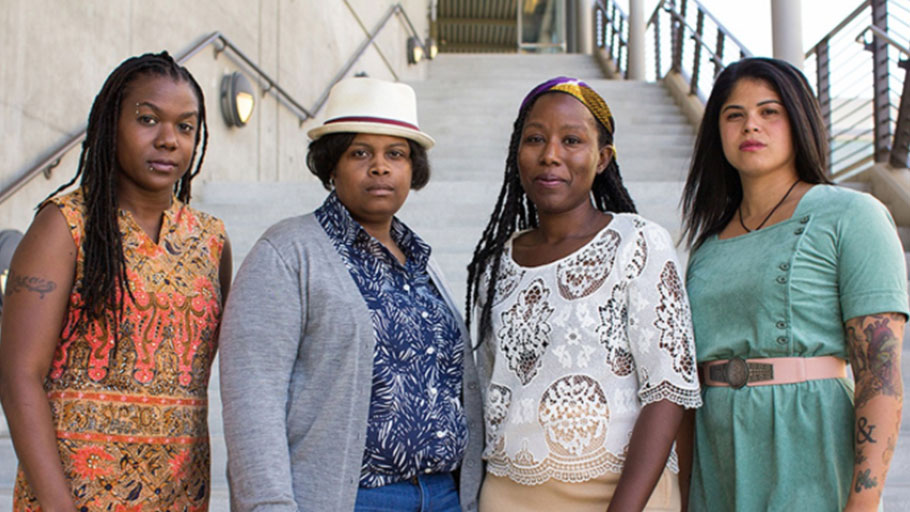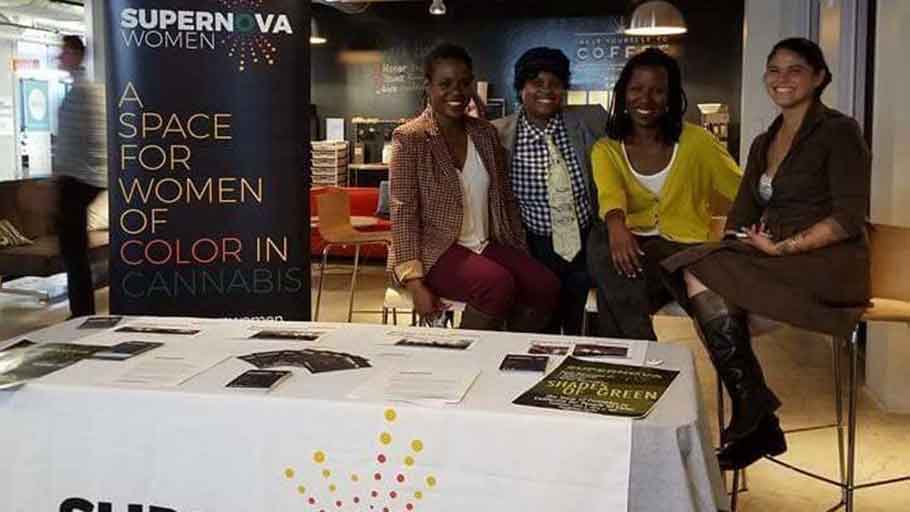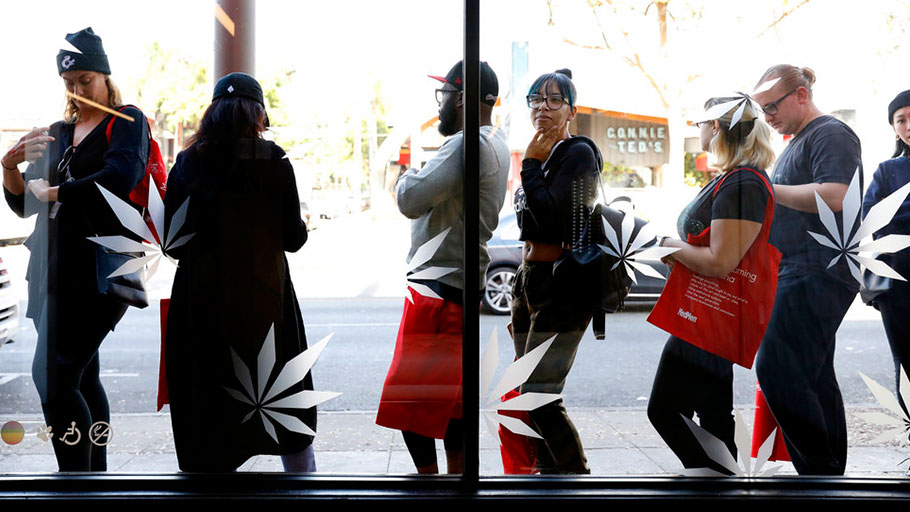Nina Parks bought a VIP ticket for her first cannabis business conference in early 2015.
“It was so expensive, I thought, I don’t even know how I’m going to pay for this,” she said, but she was new to the industry and hoped the meet-and-greet would offer networking opportunities with like-minded owners and operators in the growing medicinal market.
“I walked into that room, and I saw Amber, and she was the only one who had weed and the only woman of color,” Parks said.
Amber Senter, an entrepreneur and consultant in the business, was also the only woman of color on any of the conference’s panels, which delivered industry insight to an audience that seemed to have little personal or political investment in the plant and a lot more money to spend than those who did.
“I was like, what is going on? Is this what the industry looks like? It’s just white men in suits!” Park recalls asking Senter. “Many, many, many white men in suits.”
This was not a reflection of the industry as they knew it. Parks and Senter were based in California, which became the first state to legalize medicinal marijuana in 1996. In 2013, the Justice Department under President Barack Obama, in a document known as the Cole memo, limited federal intervention in state-level legalization. The “Green Rush” hurtled toward the Golden State, and it was mostly white and male.

Andrea Unsworth, left, Amber Senter, Tsion Lencho and Nina Parks formed the nonprofit Supernova Women in 2015. Photo: Roxane Pasibe, East Bay Express
Senter was consulting for cannabis businesses when she met Tsion Lencho, an attorney, at an industry event. They both worked to help prospective businesses navigate tax and regulatory structures, and they were troubled by the lack of inclusion and how gentrified the industry could become with full legalization.
At the time, Parks, Lencho and entrepreneur Andrea Unsworth had tried to bring more of an activist focus to existing women’s cannabis industry groups. “We just saw that wasn’t going to happen, and we weren’t going to try to change that,” Unsworth said.
The four women founded Supernova Women to fill the gap: a nonprofit organization by and for women of color in the emerging cannabis industry. The four women, each experts in their fields, work to lower barriers to entry for people of color in the emerging cannabis industry and advocate on their behalf in California’s rapidly expanding market.

Supernova Women helps people prepare applications for permits and licenses in a changing regulatory environment. Photo: Supernova Women
Unsworth, who has an MBA and was a cannabis entrepreneur when the group began, said she wanted to advocate for those who were very present in the gray-market industry ― women and people of color ― but who were largely missing from conversations about the policies that would shape it.
“We saw that there was more to be done than just networking,” Unsworth said. “We wanted the same women attending those events to come to city council meetings and have their stories told, not just in these women’s meetings.”
Around the same time Supernova Women formed in 2015, California cannabis policy went into overdrive, and legalization seemed inevitable.
Lencho studied cannabis prohibition and policy in law school at Stanford. When she entered the field as an attorney providing guidance for cannabis businesses, she was surprised how little consideration was given to addressing the harms that had been caused by criminalization.
“When you came to the business side of things, there was a complete dearth of conversation about inclusion, even though social and racial justice were at the forefront of the talking points around why you should legalize and why you should allow local jurisdictions to give permits,” Lencho said. “But no one was talking about providing permits for those who actually went to jail for cannabis.”
In November 2016, California passed Proposition 64, which legalized recreational, or “adult use,” marijuana and included sweeping measures to address harm caused by its prohibition. Localities would establish their own rules for approving licenses to sell recreational cannabis beginning on Jan. 1, 2018.
Lawmakers and advocates began to discuss what it might look like if legalization policies embraced restorative justice. How can communities of color, whose access to the networks and means required to start a business for cannabis had long been oppressed by the rules governing it, now benefit from what is projected to be the largest and most profitable market in the U.S.?

Customers line up in West Hollywood as the legal sale of recreational marijuana begins in California. Photo: Christina House, Los Angeles Times via Getty Images
The existing industry was already “inclusive of a lot black and brown faces,” Unsworth said. “We knew that people were just going to run in here and buy up all the property and just take it over. If nothing else, we wanted to slow it down and make sure that these other considerations were on the table.”
Supernova Women, based in Oakland, attended city council meetings across the Bay Area to advise localities on how they might preserve and promote the diversity in the industry, address disparities and even implement legalization policies that consider the disproportionate effect of criminalization on people of color.
No one was talking about providing permits for those who actually went to jail for cannabis.” — Tsion Lencho, attorney, Supernova Women co-founder Tsion Lencho, attorney, Supernova Women co-founder
In early 2017, Oakland City Councilwoman Desley Brooks put forward a radical “equity permit” plan to address the harmful effects of prohibition on communities of color: When handing out permits, prioritize those who had been hit the hardest by marijuana criminalization.
“When you look across this country, the people who are making money in respect to cannabis and recreational marijuana are white men,” Brooks told Rolling Stone earlier this year. “The people who have historically gone to jail for the same activity are predominantly African-American and Latino.”
Prior to Jan. 1 and the implementation of Proposition 64, California state licensing policies prohibited anyone with a felony conviction for cannabis from starting a cannabis business, so any person previously in possession of a plant the state now considered legal was excluded from the legal market.
Nationally, black people are 3.5 times more likely to be arrested for marijuana possession than white people, even though the two groups consume cannabis at similar rates. In Oakland, 90 percent of cannabis arrests from 1995 to 2015 were people of color.
Oakland’s newly created department of race and equity, led by Darlene Flynn, produced an equity analysis to see how outcomes for people of color might be improved by the kind of equitable cannabis policy Brooks had proposed.
“We did outreach through the network of cannabis folks in the city of Oakland and sat with folks and asked them questions about what the barriers were and what it would take for them to overcome those barriers and to engage in the legalized cannabis market,” Flynn told HuffPost.
Supernova Women provided expertise and stakeholder perspectives for Flynn’s equity analysis. The city finalized and adopted its equity permit program in May of 2016.
The program reserves half of medical and recreational marijuana business licenses for applicants who meet certain criteria: They must live in Oakland, make less than 80 percent of the area median income, and had either been convicted of a cannabis crime or live in an area of the city with disproportionately high marijuana arrests.
It also creates incentives for applicants who don’t meet those criteria to “incubate” equity applicants and provide capital and real estate for their businesses. Those who qualify receive no-interest loans from the city.
Supernova Women urged lawmakers in San Francisco to consider a similar program. Without equity language in place on Jan. 1, when cities could officially license adult-use cannabis businesses, the city might lose a chance to ensure that those who had been hurt by the racist criminalization of the plant were first in line to create wealth from it.
Parks, who owns a delivery service in the city, introduced herself to Nicole Elliott, the first director of the city’s office of cannabis. She also created a working group with other operators in the area.
“We sat down with every single one of the board members and their staff, and every day for almost three months,” to create the guidelines Parks said.
City Supervisor Malia Cohen fiercely advocated for an equity program in San Francisco. When serving as acting mayor last September, Cohen halted approvals for new cannabis permits until steps were taken to ensure a more equitable process. She fought for and won continuances to set the city’s cannabis policy, urging her colleagues to consider the consequences of letting a privileged minority sail ahead.
The city ultimately adopted Cohen’s proposed equity program, which goes a step further than Oakland’s by requiring existing businesses to reapply for licenses. Los Angeles has since adopted its own set of equity guidelines.
“The programs are slightly different, but they all have the same basic themes,” Lencho said. “You can’t exclude people who have been formerly incarcerated, you can’t fail to provide certain technical assistance, financial assistance or real estate assistance to those people. And you have to figure out a system to prioritize those businesses getting into the market.”
Reese Benton, a cannabis entrepreneur who owns a delivery service in San Francisco, said she’d thought about shutting down when she got a call from Malia Cohen’s office to advise on an equity program.
“That’s when all the tables turned,” she said. “They told me, Oh, you cannot give up. You have to do this. You don’t know what you have. Let us help you. I thought, this is a dream, this is the answer I’ve been waiting for.”
Benton, whose father was incarcerated on drug-related charges, is reapplying for her permit through the equity program and meeting with investors who want to help expand her business.
Tsion Lencho, Malia Cohen, and Reese Benton
Women, and women of color specifically have led the charge in advocating for cannabis policy that allows for restorative justice and healing from the war on drugs.
Outside of California, Ayanna Pressley, the first woman of color elected to the Boston City Council, worked with the Minority Cannabis Business Association to develop a model equity bill. In 2017, Shaleen Title, a marijuana attorney and legalization activist, was appointed to lead the Massachusetts Cannabis Control Commission.

Shaleen Title
Despite their leadership in advocacy and policy, women of color are still largely absent from mainstream images of the cannabis industry, where say they experience casual sexism and blatant racism.
“As a black woman attorney who was educated at Stanford twice, I am repeatedly having to prove to people that I know what I’m talking about. I recognize that I may be viewed as a unicorn, but it’s astounding that people aren’t used to women attorneys,” Lencho said.
“What you see in the general business sector with regard to sexism is exacerbated by cannabis because it’s an ever-changing environment,” she added.
Unsworth said the greatest challenge women of color face when entering the cannabis industry is lack of access to networks and capital. For some, these issues are closely related to the war on drugs.
“It’s about who you know, just like any other industry. Whether it’s telecom or cannabis. If you want to be a big player, you have to know folks and you have to commit capital. And when every male in your family has been in jail at one point in their life, it’s very hard to build up capital,” she said.
Remembering those women of color who have been left behind when their men have fallen is another aspect of the war on drugs that gets forgotten about. — Andrea Unsworth, Supernova Women
Nina Parks opened Mirage Medicinal after her brother, an aspiring cannabis entrepreneur, was arrested on a cannabis charge in 2014 and sentenced to a year at Riker’s Island in New York.
“He had a vision for a delivery service and lifestyle brand called Mirage Medicinal. He had all the paperwork done,” she said. But under licensing laws at the time, his conviction would disqualify him from entering the legal market.
“I didn’t want him to sit in jail thinking everything was lost,” Parks said.
Parks procured the license for Mirage Medicinal in her name. Because of her brother’s previous conviction, they’ll be applying for a new license through San Francisco’s equity permit program this year.
Other sisters, daughters and wives of men targeted by the war on drugs are among those prioritized to receive permits to sell legal cannabis this year.
“Remembering those women of color who have been left behind when their men have fallen is another aspect of the war on drugs that gets left behind or forgotten about,” Unsworth said.
Shanita Penny is the president of the Minority Cannabis Business Association and the CEO and founder of Budding Solutions, a cannabis financial consulting firm. She described women’s outsized participation in industry activism as a “necessity.”
“The movers and shakers in the industry and activist space are phenomenal women who broke down barriers in corporate America, politics and in every other aspect of life, out of necessity,” she said. “These women are mothers, partners, wives, sisters and daughters of the men killed and imprisoned and left with few options in life as the War on Drugs rages on. We don’t have the option of not actively pursuing restorative justice in addition to creating an equitable industry. ”
Ultimately, these minority business owners hope the industry will respect their claim to the plant they helped bring out of the darkness.
“You are going to respect this plant. You’re not just going to come in here and grab on us. You’re going to respect what we have to bring to the table, and we’ve been doing this a really long time, and you’re not just going to come in here and grab it,” Unsworth said. “As women, we’re finally getting the chance to scream that as a group.”















